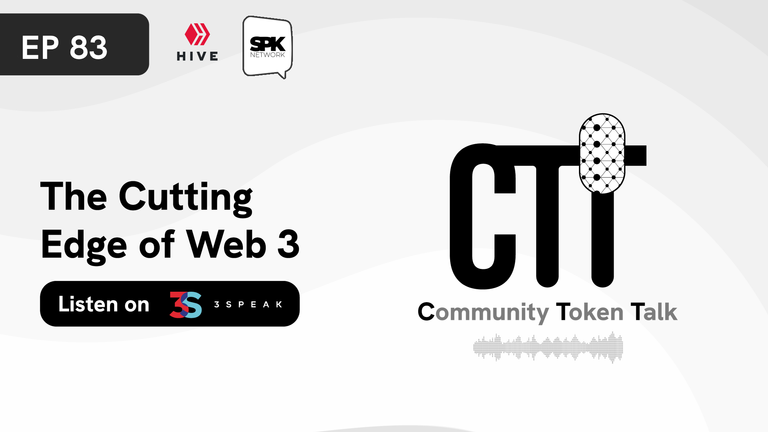Community Token Talk Podcast - Ep. 83 | Latest in Web3

Twitter Space:
https://twitter.com/3speaktv/status/1690457297292767232
https://twitter.com/pashovkrum/status/1688591468498239496?s=46&t=sk75NJ9Ju3QhJpv8OMuFtA
https://twitter.com/TheycallmeDan_/status/1690013951323447297?t=mA0NSobHr49hPornQlKX5g&s=19
SPK Network YouTube Channel
DNS Media YouTube Channel
The rewards from these posts are split among:
@bil.prag - He helps us make shorts on the @spk.network account and the YouTube Channel.
@enrique89 - Marketing and design.
And @eddiespino - Eddie helps download all the episodes from Twitter space, gather all the important links, and post the episodes to 3Speak.
SPK Network LinkTree
3Speak LinkTree
0
0
0.000
The Hive.Pizza team manually curated this post.
Learn more at https://hive.pizza.
https://leofinance.io/threads/rzc24-nftbbg/re-leothreads-shthb7qv
The rewards earned on this comment will go directly to the people ( rzc24-nftbbg ) sharing the post on LeoThreads,LikeTu,dBuzz.
The volume of the sound has greatly improved.
Here is a detailed summary article about the key topics discussed in this episode of the Community Token Talk Podcast:
Hive as a Solution for El Salvador's Bitcoin Volatility Concerns
The episode began with a discussion around a tweet from Alejandra Gujardo, an advocate for Bitcoin adoption in El Salvador. She noted that many Salvadorians are hesitant to use Bitcoin due to its price volatility. In response, the hosts proposed using the HBD stablecoin as a solution.
HBD is a fee-less, decentralized stablecoin built on the Hive blockchain that is backed by the value of Hive. Users can hold HBD to avoid Bitcoin's volatility, while still being able to use the Lightning Network and make instant, fee-less transactions. The hosts argued that this provides a practical solution for the challenges faced in El Salvador, but lamented that this information is being withheld from citizens by Bitcoin maximalists who are ideologically opposed to such an approach.
Proof of Work vs Proof of Stake vs DPOS
The conversation then shifted to a critique of the common narrative that the only options for blockchain consensus are proof-of-work and proof-of-stake. The hosts argued that delegated proof-of-stake (DPOS), as implemented on the Hive blockchain, offers a superior solution that addresses the vulnerabilities of both proof-of-work and proof-of-stake.
DPOS incorporates a reputation-based voting system for validators, making it more resistant to attacks from wealthy entities trying to centralize control. The hosts explained how this approach has allowed Hive to successfully fork and defend against attempted takeovers, in contrast to the challenges faced by proof-of-stake networks.
The Importance of Decentralized Infrastructure
A key point emphasized was the need for decentralized infrastructure to support digital rights and freedoms. The hosts argued that centralized services, even if they claim to support free speech, ultimately represent a single point of failure that can be exploited or co-opted.
In contrast, the Hive blockchain and associated projects like the SPK Network provide a decentralized foundation for applications and communities to thrive without reliance on centralized intermediaries. This includes decentralized storage, encoding, and content distribution - all of which are being incentivized to create a truly peer-to-peer, censorship-resistant ecosystem.
The Race for Digital Freedom
The hosts expressed concern about the rapid centralization of power occurring across the tech industry and the potential for a dystopian future where individuals are trapped in a system of social credit scores and restricted freedoms. They argued that projects like Hive represent a critical counterpoint, providing the tools and infrastructure for people to build truly decentralized digital communities and economies.
While acknowledging the significant challenges and opposition they face, the hosts remained resolute in their belief that Hive and associated technologies represent the best path forward for preserving digital human rights. They encouraged the audience to get involved, contribute, and help spread awareness of these solutions before it's too late.
Overall, this episode provided a comprehensive overview of Hive's unique value proposition, the limitations of existing blockchain paradigms, and the high-stakes battle for the future of the internet and digital freedom.
Notice: This is an AI-generated summary based on a transcript of the video. The summarization of the videos in this channel was requested/approved by the channel owner.